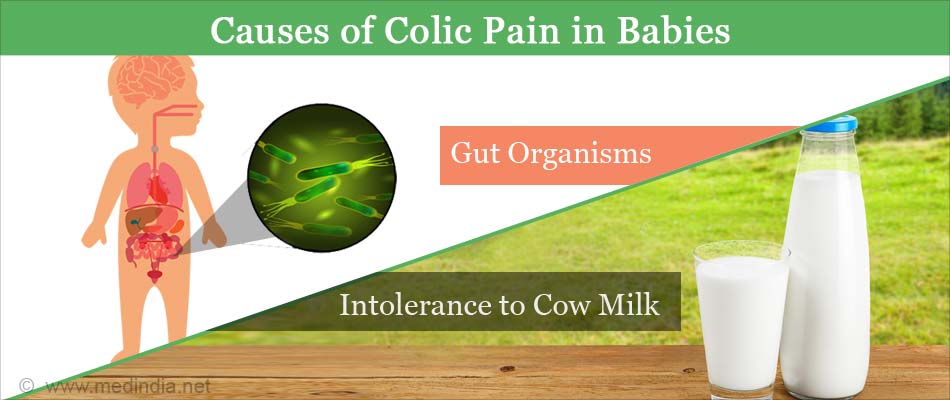- Colic - (http://www.nhs.uk/Conditions/Colic/Pages/Introduction.aspx)
- Colic Definition - (http://www.mayoclinic.org/diseases-conditions/colic/basics/definition/con-20019091)
What is Colic?
Colic baby defines the excessive bouts of crying at predictable periods in an otherwise healthy, and well fed child. The colic is often, due to the muscle spasm in the abdomen.
This is a frustrating condition for the parents as they are unable to identify the cause for this cry, and often puts both the parents and the child at distress. Looking after a colicky child is difficult, however this condition is often seen to last for a short duration. These bouts of crying are most often seen in the evening, but rest assured this is a temporary condition. Often after the age of 3-6 months, the condition usually subsides.
Statistics suggest that 3 out of 10 healthy babies suffer from this condition. This is one of the first major challenges in parenthood that will eventually pass away.
What Causes Colic in Babies?
Colic in babies refers to pain in the abdomen due to muscle spasm, though many studies have been conducted to identify the actual cause, yet it remains unknown. Possible causes for colic that have been suggested by researches include:
- The abnormal growth of gut organisms that correct after a while.
- The hormonal levels that may play a role in the gut movement resulting in colic.
- In some cases intolerance to cow’s milk has been cited as a cause of colic.
- Gas in the digestive tract
- Oversensitive infant that reacts to excessively bright or noisy stimuli

What are the Signs and Symptoms of Colic?
These are the signs and symptoms that you should look for, if you are suspecting your baby to be suffering from colic:
- Bouts of crying that are intense going on throughout day/night. In some cases it may appear as a sense of restlessness seen in the night.
- These crying episodes are often predictable.
- During these episodes the parents face difficulty in calming the child.
- The child often cries for an unapparent reason, with clenched fist, legs curled and tense abdominal muscles.
- The period between these bouts tend to be calm.
- Babies are feeding well.
- There is weight gain and achieves growth milestones for age.
How do You Diagnose Colic?
Diagnosis of colic is a diagnosis of exclusion. When all the other causes of pain abdomen have been looked into and found to be absent then this diagnosis is made. Often it also looked to see if the baby is feeding well and gaining weight. If the baby is gaining adequate weight for age and all other conditions for pain abdomen are excluded, then this is the most probable diagnosis.
Some conditions that have to be looked into before making the diagnosis of colic include:
- Volvulus
- Intussusception
- Lactose intolerance
- Testicular torsion
- Diaper rash
- Hernia strangulated
How to Treat Colic?
There is no specific treatment for colic. It resolves on its own, however it may last for upto 3 to 6 months of age.
- Parents are advised and reassured that there is no reason for despair and they are not at fault for the child’s situation. This is just a part of childhood that will resolve.
- Calming the baby by pressing the stomach against our bodies and rubbing the back, or swinging from side to side, speaking to the baby soothingly, or trying to feed the baby or using a pacifier are some of the measures that could be tried.
Often medications that can be prescribed include:
Gas relief medication: Over the counter products containing simethicone are indicated as it is safe for the baby. Other disease conditions should be ruled out before starting this medication.
Probiotics: These substances help in building the good bacteria of the digestive system. However, there exist mixed opinions on the results of administering probiotics to the baby in various research studies.
- It should be also checked whether the child is suffering from lactose intolerance. This occurs when the child is allergic to the lactose sugar that is found in milk. This will be diagnosed by the child specialist. The condition will require providing a diet with baby formula feeds that do not contain lactose sugar.
Health Tips
Techniques can be taken up by the parents to soothe the child include:
- Check if your baby is wet or cold and change clothes frequently to ensure that your baby is comfortable.
- Frequent feeds will be required in early months.
- Try to develop a relaxed atmosphere around the baby, it helps in preventing any anxious feelings in the baby that could result in colic.
- If the parent is feeling frustrated or losing temper, he/she should place the baby in safe hands and move away from the situation to prevent worse outcomes.
- Gentle rocking movements of the baby may help. The child should not be violently shaken.
- Soothing music will also help the baby in settling.
- Following feeding of the baby, proper burping should be done to prevent colic. Softly massage the abdomen of the baby during crying.
- The crying episodes should not be taken as a reason to pamper the baby unnecessarily.
- Parents should remain positive and understand that these crying episodes will resolve.
- Additional support should be taken from family members or counselor if necessary.








